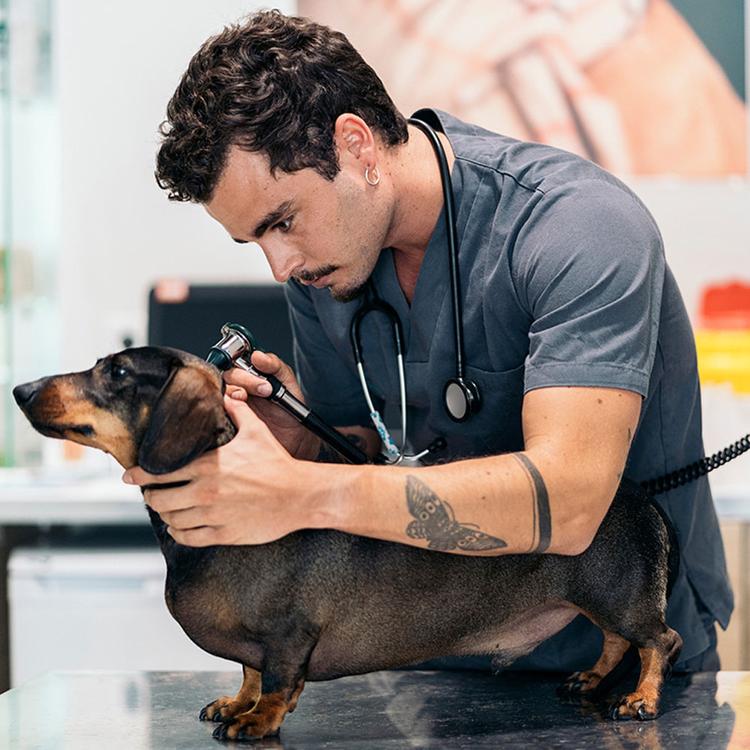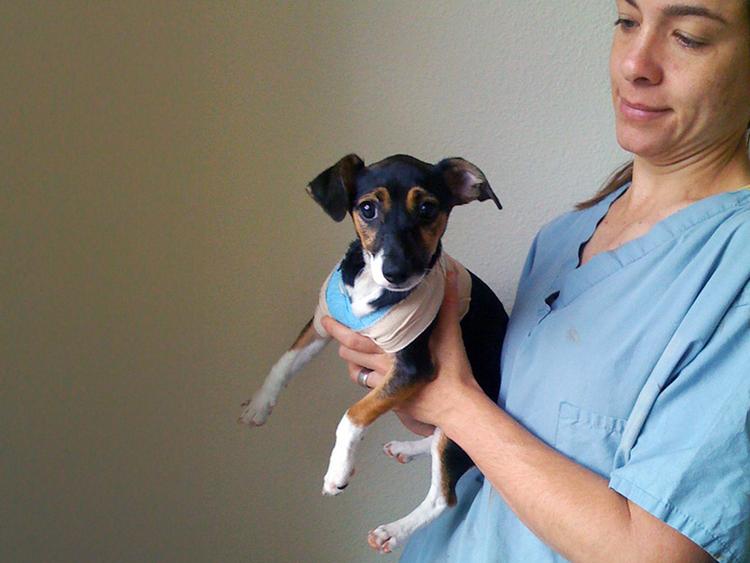How to Treat Worms in Dogs
Worm infections are more common than you’d think, especially in puppies. But the good news? They’re very treatable.
Worm infections are more common than you’d think, especially in puppies. But the good news? They’re very treatable.
by Adrienne A. Kruzer, BBA, RVT, LVT, | August 15, 2024

Dasya - Dasya / Adobe Stock
As a new dog parent, discovering that your pup has worms can be alarming. As much as you don’t want to think about — much less, talk about — worms, it’s important to tackle these infections as soon as possible. Because, while they are common, they are also quite treatable.
Understanding how worms can impact a dog’s health and how to treat and deter them with dewormers and preventives is crucial for your puppy’s well-being. Because if worms are ignored, they will multiply, causing worse symptoms. Below is a guide to everything you need to know about treating and preventing worms in dogs.
Not all intestinal parasites are worms, and not all worms are intestinal parasites. But when someone thinks about worms, they usually visualize spaghetti-like worms in puppy poop. While these spaghetti-like worms can be spotted (especially in young dogs), they are not the only common type of worms found in puppies.
Roundworms are the classic spaghetti-like worms that many people picture when they think of worms in puppies. These common worms are estimated to be found in 99 percent of puppies which means it’s almost guaranteed that your puppy has had, has, or will have roundworms. Roundworm eggs can cause infection in a dog if they eat infected poop, rodents, earthworms, birds, or cockroaches— or if they’re passed on from their mother through the placenta before birth.
Hookworms are less common than roundworms, but about two percent of all dogs tested in the United States will test positive for these small worms. The risk increases to about six percent if your puppy lives in the Southeast part of the country. Hookworms are shorter than roundworms and latch onto the intestinal lining of puppies (and they can also migrate under human skin). If a canine mother is infected, the worms can infect a puppy before birth through the placenta or after birth through nursing. Puppies can also get hookworms if they eat dirt containing microscopic hookworm eggs, and even contract them through their skin if they come into contact with hookworms.
While less common than both roundworms and hookworms, whipworms are another type of worm found in puppy poop. Although these worms only grow to be about a fourth of an inch long, they can irritate the intestinal lining and cause very serious issues. Puppies can get infected by ingesting the worm’s microscopic eggs, which can live in soil.
Tapeworms are often described as resembling pieces of rice, but they can also appear as flat, long, segmented worms before breaking apart. Tapeworms are passed through flea bites in both adult dogs and puppies.
Heartworms are passed from mosquitoes to dogs. They initially enter the bloodstream and ultimately infect the heart. Because they are not intestinal parasites, these worms are not found in puppy feces.
Giardia and coccidia are two common intestinal parasites that are protozoans (and not worms). Although present in puppy poop, they are often not visible. Dogs can contract these parasites through infected water, grass, or soil.
Depending on the type of worm, the signs and symptoms in puppies might vary. But if your puppy is experiencing any of the following symptoms of worms, you should seek veterinary attention.
A puppy can have intestinal parasites without you ever seeing visible worms in their poop. But if you do see white worms, this is a clear indication that a puppy deworming is needed.
Since worms often steal a lot of the nutrition that your puppy gets from their food, you may notice that your puppy isn’t gaining weight or growing properly. Regular weigh-ins at your vet clinic — or at home using a small scale — can help detect this indication of worms early on.
Do roundworms in puppy bellies make them round? Sometimes, yes. Roundworms can give your puppy a pot-bellied or bloated appearance, but not all worms will cause this symptom.
Veterinarians often recommend that dog poop be “kickable” as a sign of health. So if your puppy’s poop is too soft or runny to kick, that may be a sign that something’s not normal and your dog needs a deworming. (You may or may not see visible worms in your puppy’s poop.) Vomiting is another indication that something is wrong with your puppy’s belly, and you may even see worms in the vomitus.
Worms can cause your puppy discomfort, pain, and even weakness. This is due to the space they are taking up in your puppy’s belly, the intestines they may be blocking, and the nutrition they are stealing. A puppy who isn’t active is a puppy who isn’t healthy.
Shiny fur and supple skin are indications of good health. If your puppy has brittle or thinning fur, and dry or flaky skin, it may mean they have a health issue. A worm infestation can be the reason for this, due to the nutrition it’s stealing from your puppy.
Most worms that puppies can get will be eliminated in their poop, but some can’t be seen by the naked eye or are difficult to identify. Thankfully, there are a few methods by which worms can be diagnosed.
If you suspect your puppy has worms, make an appointment with your veterinarian so they can examine your puppy and their poop. If you’ve seen worms in your puppy’s poop, put it in a sealed bag and bring it with you to the vet visit. If this isn’t possible, try to take a picture of the worms that you’ve seen. Visualization of the worms will help your veterinarian determine a diagnosis, after which a test will also likely be performed to check the feces at a microscopic level.
Several different fecal tests can determine what kind of worms may be infecting your puppy. A poop sample will be needed to perform a fecal float, centrifugation, or direct smear to look for worm eggs and larvae under a microscope. These tests will determine whether or not your puppy has worms. Depending on what your veterinarian suspects your puppy has, these tests may be performed in an animal hospital or sent out to an external laboratory. Another fecal testing method called an antigen test is also available if your veterinarian suspects your puppy has giardia, a protozoan intestinal parasite that does not produce worms.
If left untreated, worms can cause a variety of serious issues in your puppy. A puppy may not grow, become malnourished, get dehydrated, and even die because of these symptoms if the worms are left untreated long enough.
A variety of dewormers are available to get rid of worms in puppies. Depending on the type of worm that your puppy has, they may require a special type of dewormer and specific dosing. How to deworm a puppy and when to deworm puppies are questions your veterinarian will be able to answer.
Pyrantel pamoate: Treats roundworms and hookworms
Fenbendazole: Treats roundworms, hookworms, whipworms, and tapeworms
Praziquantel: Treats tapeworms
Febantel: Treats whipworms
Piperazine: Treats roundworms
Milbemycin oxime: Treats roundworms, hookworms, and whipworms
Moxidectin: Treats roundworms, hookworms, and whipworms
Oxantel: Treats whipworms
Epsiprantel: Treats tapeworms
Nitroscanate: Treats tapeworms
Praziquantel/pyrantel pamoate/febantel: Treats roundworms, hookworms, whipworms, and tapeworms
Although you can treat worms in puppies, it’s always best to prevent your puppy from getting them in the first place. A variety of drugs (and combinations of them) are available to prevent your dog from getting worms. These drugs are typically given to your puppy each month alongside heartworm, flea, and tick preventatives.
Fenbendazole: Prevents roundworms, hookworms, and whipworms
Milbemycin oxime: Prevents roundworms, hookworms, and whipworms
Milbemycin oxime/afoxolaner: Prevents roundworms and whipworms
Milbemycin oxime/lufenuron: Prevents roundworms, hookworms, and whipworms
Milbemycin oxime/lufenuron/praziquantel: Prevents roundworms, hookworms, and tapeworms
Milbemycin oxime/praziquantel: Prevents roundworms, hookworms, whipworms, and tapeworms
Milbemycin oxime/spinosad: Prevents roundworms, hookworms, and whipworms
Moxidectin: Prevents roundworms, hookworms, and whipworms
Moxidectin/imidacloprid: Prevents roundworms, hookworms, and whipworms
Pyrantel pamoate: Prevents roundworms and hookworms
Piperazine: Prevents roundworms
Ivermectin/pyrantel pamoate: Prevents roundworms and hookworms
Ivermectin/pyrantel/praziquantel: Prevents roundworms, hookworms, and tapeworms
At your puppy’s first vet visit, your veterinarian will examine them for any abnormalities. They will listen to their heart and lungs, look inside their ears and mouth, examine their eyes, and make sure everything feels normal on their body. They will discuss what you are feeding your puppy, normal puppy behavior, vaccines, deworming, and preventatives. Additionally, a poop sample will be tested to see if your puppy has any worms, even if they aren’t showing any symptoms of an infestation.
Yes, intestinal parasites are zoonotic, so you can get worms from your puppy. Worms are not airborne, but some worms can be passed to people through the skin or by ingesting the eggs. It is always best to wash your hands thoroughly, avoid touching your face and mouth, and wear shoes outside where your puppy poops if they have worms.
While many home remedies claim to help treat worms in puppies, there aren’t many scientific studies on them. Some evidence suggests giving your puppy pumpkin-seed oil, onion extract, garlic extract, or betel nuts can treat different types of worms. Since evidence is very limited, you should always discuss home remedies with your veterinarian before giving them to your puppy.
Evaluation of the Anthelminthic Activity of Garlic (Allium Sativum) and Betel Nut (Areca
Catechu) in Pups Naturally Infected With Hookworms
Gastrointestinal Parasites of Small Animals
Hookworms: Information for Dog Owners

Adrienne Kruzer is an accomplished veterinary technician and writer with over 15 years of hands-on experience caring for domestic and exotic animals.

Adoption Advice
Adoption Advice

Adoption Advice

Adoption Advice
Wondering what to expect from your puppy’s first vet visit? Read more to learn about how to prepare and what to expect.

Adoption Advice
Hesitant to adopt a dog? We break down common dog adoption worries and offer practical tips for a smooth transition.

Shelters & Rescue
What pet parents should know about adopting a parvo puppy.

Adoption Advice
Here’s what you should know about dog vaccines.


Breed Info
Even though smaller dogs live longer, big dogs can still pack a healthy punch.